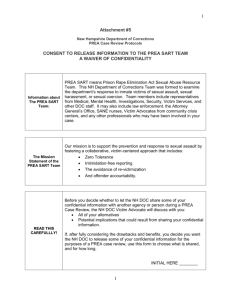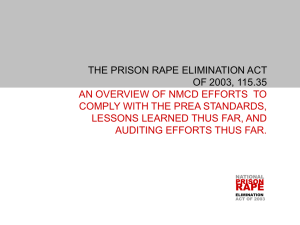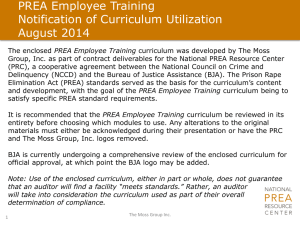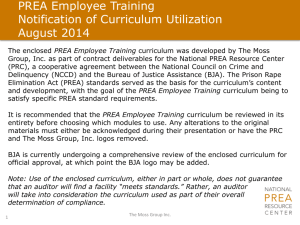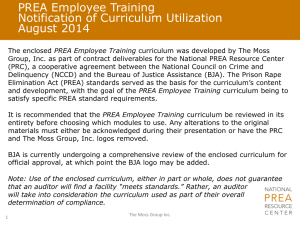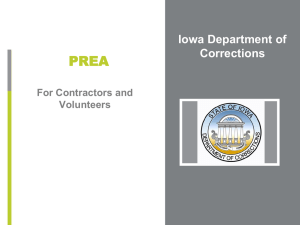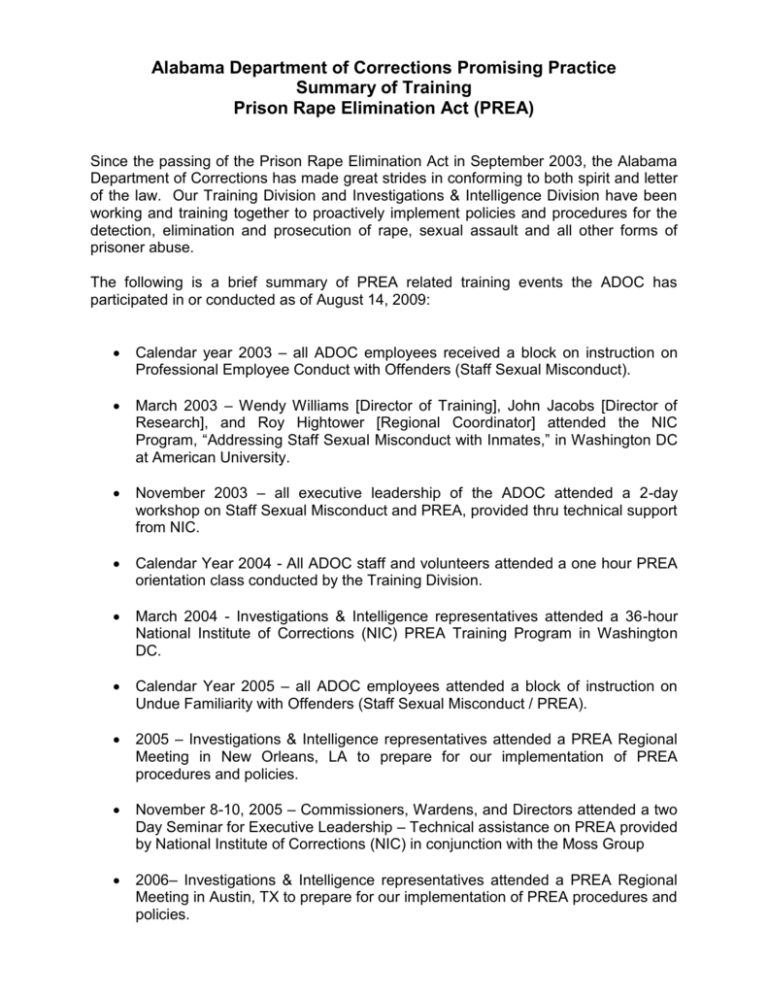
Alabama Department of Corrections Promising Practice
Summary of Training
Prison Rape Elimination Act (PREA)
Since the passing of the Prison Rape Elimination Act in September 2003, the Alabama
Department of Corrections has made great strides in conforming to both spirit and letter
of the law. Our Training Division and Investigations & Intelligence Division have been
working and training together to proactively implement policies and procedures for the
detection, elimination and prosecution of rape, sexual assault and all other forms of
prisoner abuse.
The following is a brief summary of PREA related training events the ADOC has
participated in or conducted as of August 14, 2009:
Calendar year 2003 – all ADOC employees received a block on instruction on
Professional Employee Conduct with Offenders (Staff Sexual Misconduct).
March 2003 – Wendy Williams [Director of Training], John Jacobs [Director of
Research], and Roy Hightower [Regional Coordinator] attended the NIC
Program, “Addressing Staff Sexual Misconduct with Inmates,” in Washington DC
at American University.
November 2003 – all executive leadership of the ADOC attended a 2-day
workshop on Staff Sexual Misconduct and PREA, provided thru technical support
from NIC.
Calendar Year 2004 - All ADOC staff and volunteers attended a one hour PREA
orientation class conducted by the Training Division.
March 2004 - Investigations & Intelligence representatives attended a 36-hour
National Institute of Corrections (NIC) PREA Training Program in Washington
DC.
Calendar Year 2005 – all ADOC employees attended a block of instruction on
Undue Familiarity with Offenders (Staff Sexual Misconduct / PREA).
2005 – Investigations & Intelligence representatives attended a PREA Regional
Meeting in New Orleans, LA to prepare for our implementation of PREA
procedures and policies.
November 8-10, 2005 – Commissioners, Wardens, and Directors attended a two
Day Seminar for Executive Leadership – Technical assistance on PREA provided
by National Institute of Corrections (NIC) in conjunction with the Moss Group
2006– Investigations & Intelligence representatives attended a PREA Regional
Meeting in Austin, TX to prepare for our implementation of PREA procedures and
policies.
2006 – Investigations & Intelligence representatives attended a PREA Regional
Meeting in Albany, NY to prepare for our implementation of PREA procedures
and policies.
January through April 2006 – A two hour seminar on PREA was provided to all
LE Staff, Support staff, Contract staff and vendors, Additional training was
provided to the Alabama Department of Public Health at sites throughout the
state
October 2006 – Training Director and Deputy Director attended a Training for
Trainers presented by the National Institute of Corrections (NIC) in Portland OR
in conjunction with the Moss Group.
March 1st, 2007 – Nine (9) Regional PREA Coordinators were appointed to
coordinate regional response teams who respond to PREA related incident.
March 19 - 23, 2007 – Regional PREA Coordinators attended a 36-hour
“Training for the Trainer” with resources provided by the National Institute of
Corrections (NIC) in conjunction with the Moss Group.
May 21 & 22, 2007 – Investigations & Intelligence Division Director, Training
Division Director, Investigators and PREA Coordinators attended a 24-hour joint
training conducted by the Moss Group focusing on Sexual Assault Investigation
within Prison Settings.
Calendar Year 2007 – A six hour block of PREA/Staff Custodial Sexual
Misconduct Training was conducted for all LE Staff and all Support Staff. This
training was conducted as part of annual In-Service Training.
April 2007 – PREA Female Offender Education classes began at Julia Tutwiler
Prison for Women and the Birmingham Community Work Center.
May 2007 – PREA Male Offender Education classes began at Limestone
Correctional Facility.
June 2007 – PREA Offender Education was conducted for ADOC inmates
incarcerated in a contracted Louisiana facility
May 13 - 16, 2008 – Regional PREA Coordinators attended a 40-hour week long
“Training for the Trainer” conducted by members of the ADOC Training Division
with resources provided by the National Institute of Corrections (NIC) and the
Moss Group
November 2008 – PREA Offender Education was completed for all ADOC
facilities located throughout the state
January through December 2009 – A two hour PREA Update Seminar is being
conducted for all ADOC LE Officers and all Support/Contract Staff. Also during
this same period, a two hour PREA Supervisor Training Seminar is being
conducted for all ADOC LE Supervisors and all Support/Contract Supervisors.
This training is conducted as part of 2009 annual In-Service Training.
July 13 - 16, 2009 – Regional PREA Coordinators attended a 40-hour week long
“Training for the Trainer” conducted by members of the ADOC Training Division
with resources provided by the National Institute of Corrections (NIC) and the
Moss Group
January through December 2010 – A two hour PREA Update Seminar was
conducted for all ADOC LE Officers and all Support/Contract Staff. Also during
that same period, a two hour PREA Supervisor Training Seminar was conducted
for all ADOC LE Supervisor. This training was conducted as part of 2010 InService Training.
Calendar Year 2011 – Implemented a PREA Dashboard within the ADOC
computer system which consisted of training through out the year.
February 15-17, 2012 – Regional PREA Coordinators begin Training and
Development Classes offered at the University of Alabama. These classes will
take place periodically through out the year of 2012.
The Alabama Department of Corrections recognizes the unique opportunity presented
by the Prison Rape Elimination Act. Staff training will continue to highlight and reinforce
the department’s zero tolerance policy for all rape, sexual assault and all forms of
offender abuse.
Offender education will continue until all offenders already in our custody understand
our procedures and their rights. Offenders will also be educated at initial intake
regarding the Prison Rape Elimination Act. This training will focus on offender reporting
procedures and ways offenders can protect themselves through their own actions and
behaviors.

